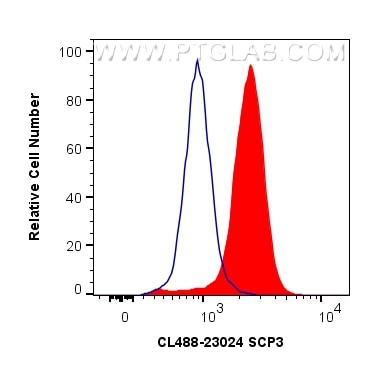CoraLite® Plus 488-conjugated SCP3 Polyclonal antibody
SCP3 Polyclonal Antibody for FC (Intra)
Host / Isotype
Rabbit / IgG
Reactivity
human, mouse, rat
Applications
FC (Intra)
Conjugate
CoraLite® Plus 488 Fluorescent Dye
Cat no : CL488-23024
Synonyms
Validation Data Gallery
Tested Applications
| Positive FC detected in | Jurkat cells |
Recommended dilution
| Application | Dilution |
|---|---|
| Flow Cytometry (FC) | FC : 0.80 ug per 10^6 cells in a 100 µl suspension |
| Sample-dependent, check data in validation data gallery | |
Product Information
CL488-23024 targets SCP3 in FC (Intra) applications and shows reactivity with human, mouse, rat samples.
| Tested Reactivity | human, mouse, rat |
| Host / Isotype | Rabbit / IgG |
| Class | Polyclonal |
| Type | Antibody |
| Immunogen | SCP3 fusion protein Ag19330 相同性解析による交差性が予測される生物種 |
| Full Name | synaptonemal complex protein 3 |
| Calculated molecular weight | 236 aa, 28 kDa |
| Observed molecular weight | 30 kDa, 33 kDa |
| GenBank accession number | BC062662 |
| Gene symbol | SYCP3 |
| Gene ID (NCBI) | 50511 |
| Conjugate | CoraLite® Plus 488 Fluorescent Dye |
| Excitation/Emission maxima wavelengths | 493 nm / 522 nm |
| Form | Liquid |
| Purification Method | Antigen affinity purification |
| Storage Buffer | PBS with 50% Glycerol, 0.05% Proclin300, 0.5% BSA, pH 7.3. |
| Storage Conditions | Store at -20°C. Avoid exposure to light. Stable for one year after shipment. Aliquoting is unnecessary for -20oC storage. |
Background Information
SYCP3 is an essential structural component of the synaptonemal complex. This complex is involved in synapsis, recombination and segregation of meiotic chromosomes. SYCP3 is required for centromere pairing during meiosis in male germ cells. SYCP3 is also required for normal meiosis during spermatogenesis and male fertility. Mutations in SYCP3 are associated with azoospermia in males and susceptibility to pregnancy loss in females.
Protocols
| Product Specific Protocols | |
|---|---|
| FC protocol for CL Plus 488 SCP3 antibody CL488-23024 | Download protocol |
| Standard Protocols | |
|---|---|
| Click here to view our Standard Protocols |


